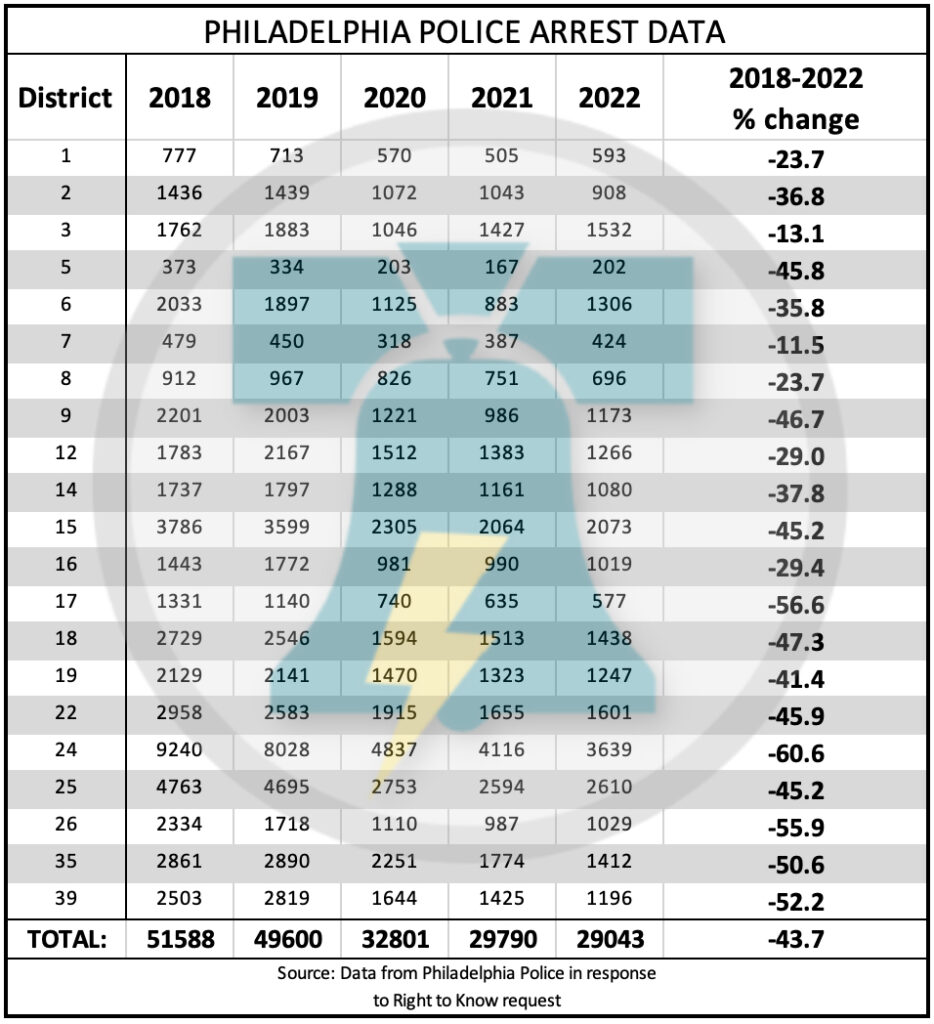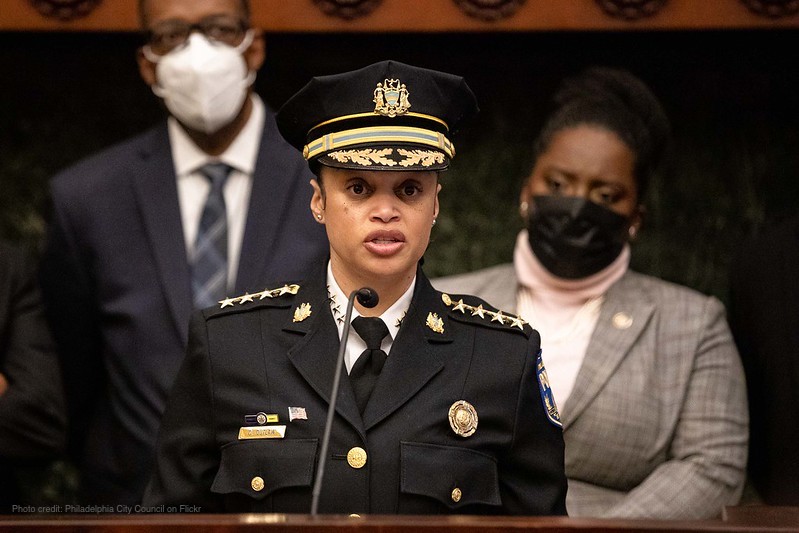Arrests in Philadelphia nosedive while reported incidents increased over last five years
Arrests in Philadelphia have plunged almost 45 percent since 2018, even though the number of incidents reported to police are up 32 percent, according to data obtained from the police department via a Right-to-Know request as well as from data regularly published by the department.
In 2018, the Philadelphia Police Department counted 49,570 total arrests in Philadelphia. By 2022, that number dropped to 27,021.
At the same time, the number of incidents reported to police in the categories of violent crime and property crime went up. According to regularly published data from the police department, reports of violent crimes increased seven percent, while property crimes shot up 40 percent from 2018 through 2022.
READ MORE — Rep. Joshua Kail: The death of a budget negotiation
Analyzing the two data sets together shows in 2018, there were 78 arrests in Philadelphia for every 100 incidents reported. By 2022, however, that ratio dropped to 32.
(That analysis only uses violent and property crime totals, because those are the two major categories routinely self-reported by Philadelphia Police on their data page. The two categories combined usually represent roughly 95 percent of reported incidents in any given year.)
The arrest data, broken out by district, only reaches as far back as 2018, according to the response from the city’s law department when providing documents to the original Right-to-Know request from Broad + Liberty.
The data also show that most of the slide came from 2018–2021, and then the decline began to level off in 2022.

Police Commissioner Danielle Outlaw, whose tenure with PPD did not begin until 2020, pointed to several factors that could be at play. For example, she said the department, like other departments nationwide, is still trying to assess the way the pandemic changed a number of underlying assumptions about crime and policing.
“Lockdowns, restrictions, and changes in social dynamics may have contributed to a decrease in certain types of crimes, leading to a decline in arrests. However, data suggests that effects of the pandemic may have concurrently led to an increase in other types of criminal behavior,” Outlaw said. “That said, we are not at a point yet in the law enforcement profession where we can definitively say what the correlation is between the Covid-19 pandemic and criminal behavior.”
“Furthermore, changes in arrest policies and practices, both within and outside the PPD, have possibly influenced the arrest numbers. The MacArthur Safety and Justice Challenge grant, for instance, aimed to reduce the jail population by promoting alternatives to arrests for lower-level offenses,” Outlaw pointed out. “This initiative, along with other diversion programs, has likely contributed to a decrease in overall arrest numbers.”
Commissioner Outlaw’s full response is embedded at the end of this article.
The MacArthur Safety and Justice Challenge grant comes from the John D. and Catherine T. MacArthur Foundation, one of the 50 richest charities worldwide. Its website says the safety and justice grants are made to “support policies and practices that will safely reduce jail populations by 50 percent across all Safety and Justice Challenge jurisdictions by 2025 and eliminate racial inequities.”
Outlaw also pointed to diversion tactics for “low-level” offenses like retail theft, small amounts of drug possession, and prostitution as possible contributors to the decline. Other low-level offenses like disorderly conduct are now handled with code violation notices, which, Outlaw said, “aims to address low-level offenses through less punitive means.”
Combined with dwindling police resources and the effect of the pandemic, Krasner’s policies appear to be having a clear effect on arrests in Philadelphia.
One ranking official within the police department placed blame for the decline in arrests in Philadelphia on the philosophical shifts that began to dominate in the wake of Larry Krasner’s election to district attorney in November 2017.
“Whereas criminals get the benefit of the doubt and are not charged, or are charged with significantly lesser crimes than what they committed, Larry Krasner rushes to judgment when a Philadelphia Police Officer is involved in a fatal police shooting, or a controversial use of force incident,” said the source who requested anonymity in order to speak freely.
“This has caused officers to pull back. Some call it the ‘Ferguson effect.’ In Philadelphia, we call it the ‘Krasner effect,’” the officer said.
The “Ferguson Effect” refers to a hotly debated theory, defined as “an increase in violent crime rates in a community caused by reduced proactive policing due to the community’s distrust and hostility towards police,” according to one online definition.
“Officers are no longer given the benefit of the doubt in situations that typically quickly evolve, where an officer literally has a split second to make a decision,” the source said. “Therefore, officers have decided it is not beneficial to them to proactively engage the criminal element, because if something goes wrong, Larry Krasner has repeatedly demonstrated that he will indict them and in times where he has lost in court, he refiles the charges due to his deeply rooted hatred for Philadelphia Police Officers.”
Krasner’s office did not return a request for comment.
Commissioner Outlaw, however, said the department wants to be open about issues of morale.

Photo Credit: Philadelphia City Council Flickr account
“If street-level officers express concerns about declining morale or a fear of proactive policing due to perceived reduced prosecution from the District Attorney’s Office, it is important to address those concerns,” Outlaw said. “Open dialogue, collaboration, and providing support to our officers are crucial in maintaining a healthy working environment. It is essential to foster a culture of trust, where officers feel heard and supported while balancing the need for effective law enforcement.”
A 2022 audit released by then-Controller Rebecca Rhynhart concluded that the police department’s “staffing levels have decreased significantly in recent years, from 6,590 filled uniform positions at the end of [fiscal year] 2019 to 5,983 at the end of FY 2022.”
One former prosecutor from southeast Pennsylvania agreed that a significant portion of the arrest drop had to be due to the district attorney.
“This represents a very large drop in arrests in a very short time frame,” said Manhattan Institute Fellow Thomas Hogan, a former Chester County DA and federal prosecutor. “District Attorney Krasner campaigned on fewer arrests and prosecutions. Combined with dwindling police resources and the effect of the pandemic, Krasner’s policies appear to be having a clear effect on arrests in Philadelphia.”
Yet in at least one Philadelphia suburb, trendlines are pointing to a post-Covid rebound in arrests.
“While we did have fewer arrests during Covid, and immediately after that… we are getting back to pre-pandemic numbers with regard to car stops and proactive policing,” Abington Chief of Police Patrick Malloy told Broad + Liberty.
Some cultural and policy changes on crime seem certain to be in Philadelphia’s future because of the mayoral election this November. Former state representative and city councilmember Cherelle Parker made boosting PPD’s ranks a key part of her platform that helped propel her past several other challengers in winning the Democratic nomination. The Republican nominee, David Oh, has been even more vocal than Parker about reinstating or reinvigorating some “tough on crime” policies.
Similar large drop-offs in arrests have been seen in other large cities.
A report last year from the Chicago Sun-Times found police in that city were making just twelve arrests for every 100 reported incidents in 2021, “the lowest level since at least 2001, the first year the data was made publicly available.”
Chicago, like Philadelphia, has a far-left progressive prosecutor in office, Kim Foxx. Foxx’s political rise also resembles Krasner for the fact that both owe a major part of their original electoral victories to strategically late but overwhelming amounts of campaign spending by liberal megadonor George Soros.
In Milwaukee, drug arrests dropped 67 percent from 2017–2022, while at the same time witnessing “a record-breaking rise in drug overdose deaths in Milwaukee County,” according to Urban Milwaukee.
In New York City, however, arrests increased 22 percent year-over-year from 2021–2022, according to the New York Times. Over that period, robbery and burglary drove overall increases in crime, even though murders and shootings were down.
A. Benjamin Mannes, MA, CPP, CESP, is a subject matter expert in security and criminal justice reform based on his own experiences on both sides of the criminal justice system. He has served as a federal and municipal law enforcement officer and was the former Director, Office of Investigations with the American Board of Internal Medicine. @PublicSafetySME
Todd Shepherd is Broad + Liberty’s chief investigative reporter. Send him tips at tshepherd@broadandliberty.com, or use his encrypted email at shepherdreports@protonmail.com. @shepherdreports





Maybe all the criminals in Philadelphia should run for president so they can claim that the charges against them are part of a “witch hunt”.
Or they could get somebody elected president who promises to pardon all their violent crimes.
Then they can go on and virtue signal about how they support “law and order”.
Great article that’s well researched and well written. Like many, it shows a clear decline in enforcement of the law that is a result of progressive policies in prosecution in the name of criminal justice reform. And it shows the same pattern in other major cities that contributes to the flourishing of violent crime. So, what is the solution? Law abiding citizens arming themselves in greater numbers? Well, that’s already happening. Do we call in the military to patrol the streets? A response like that is almost impossible to pull back from. No, what is necessary is a response from law abiding Americans – a rising of a demand from “We the People” that calls on those we have elected to stop with the b.s. band-aid solutions, millions more in questionable violence prevention programs and soundbites at press conferences. What is necessary is a consistent, unyielding demand for serious, aggressive action NOW against violent criminals. Action that supports our police and sends the message to violent criminals that they will be held accountable for what they do. No more sweetheart plea agreements from prosecutors and judges. No more sentencing to prison where the result is immediate probation. No, serious accountability that results in long prison sentences for violent crimes, VUFA charges, and gun trafficking. Progressive prosecutors often pat themselves on the back for reducing the prison population. Yeah, the prison population is down, and violent crime is up. Where is the logic in that?